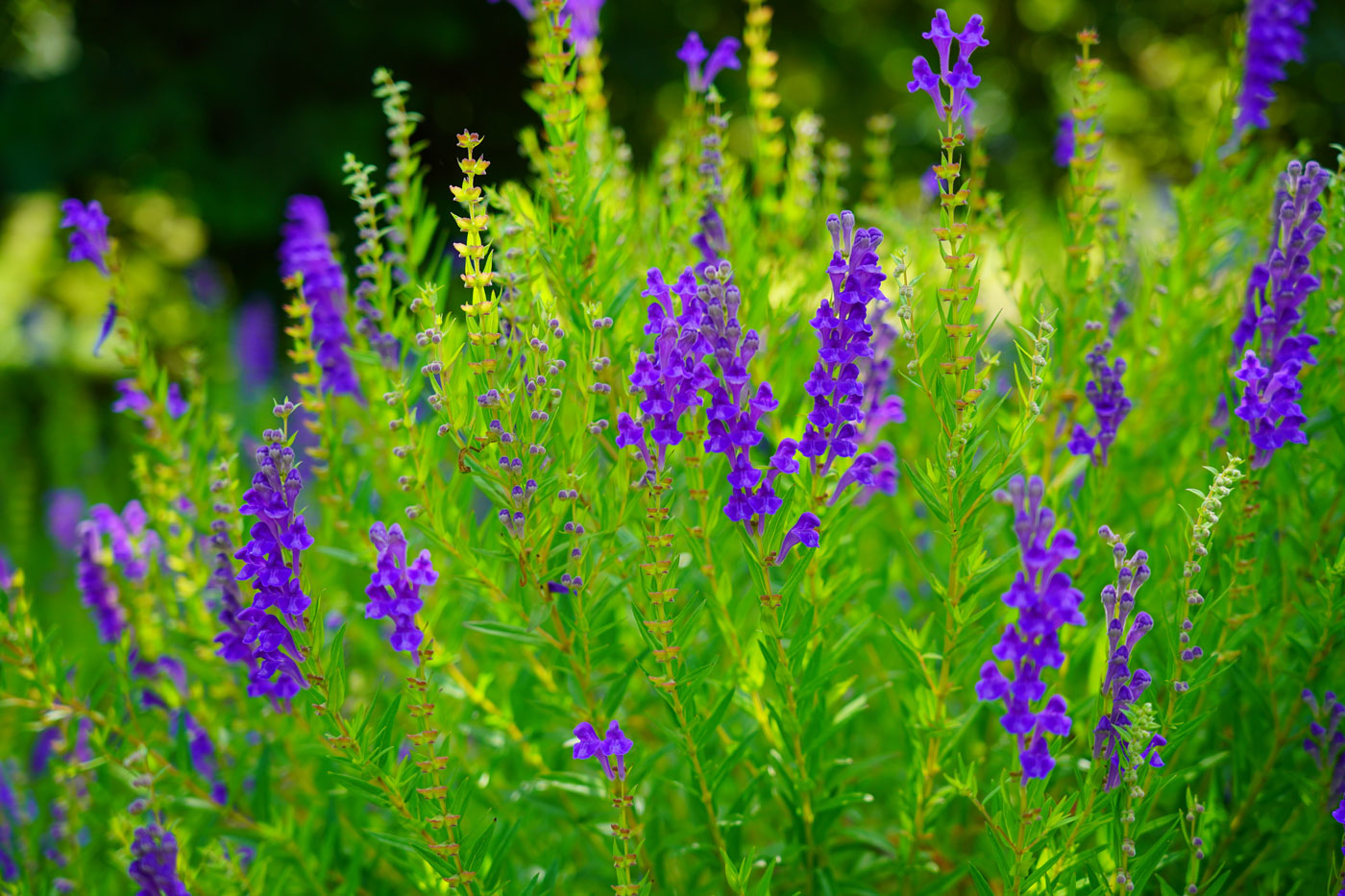A Phenomenal Healing Herb
A beloved medicinal herb in Traditional Chinese Medicine with unique health benefits, Chinese skullcap (Scutellaria baicalensis) is an outstanding remedy for a host of afflictions. Traditionally, the herb is used to relieve inflammation, allergies, anxiety, and gum inflammation/plaque. Importantly, skullcap has been shown in a number of studies to prevent the growth and spread of a range of cancers. If you have never heard about skullcap before, this is certainly one herb you should get to know. (Note this is different from American Skullcap – Scutellaria lateriflora).
Anti-inflammatory
Chinese skullcap has impressive anti-inflammatory properties, which can be especially helpful for those who have arthritis or other diseases rooted in inflammation. The plant also reduces inflammation associated with allergies by decreasing levels of histamine. Moreover, it was shown to curb the inflammatory response to allergenic proteins by reducing cytokine levels and IgE antibodies.
Additionally, two clinical trials found that when Chinese skullcap was combined with extracts of Acacia catechu stiffness, joint pain, and mobility improved in those with knee osteoarthritis — to the same level as the anti-inflammatory drug naproxen. [1,2]
Neuroprotective
A study published in the Journal of Alternative and Complementary Medicine examined several medicinal herbs for their effectiveness in protecting neuronal cells. Ginger and turmeric had the most protective action, followed closely by Chinese skullcap, Ginkgo biloba, and Chinese cinnamon. The team concluded that select herbs may be potentially important resources for preventing the onset of Alzheimer’s disease.
Moreover, skullcap is rich in flavonoids that help to scavenge toxic free radicals and suppress oxidative stress. Since a number of neuropsychiatric diseases are linked with oxidative stress — such as anxiety, Alzheimer’s disease, depression, and Parkinson’s disease, skullcap can help with a variety of mental disorders. This study found that skullcap protects against oxidative stress and has both neuroprotective and cognitive enhancement effects due to the baicalin found in Chinese skullcap.
Anxiety, Insomnia, and Sleep Disorders
Known to help ease anxiety and stress, skullcap can also alleviate sleep issues — including insomnia. Research has shown that a combination of lemon balm, passion flower, and skullcap are effective for reducing stress and anxiety, while also supporting quality sleep. You can read more about the effectiveness of passion flower and lemon balm for sleep disorders in the post, “My 6 Favorite Herbs for Defeating Insomnia Once and For All“.
Anti-Cancer
A number of studies have shown that Chinese skullcap is toxic to a range of cancers, including head and neck squamous cell carcinoma, prostate and brain cancer, as well as lymphoma and myeloma. Researchers believe that a class of antioxidants known as flavones are responsible for the anticancer properties of the plant. One study examined the effect of skullcap on fibrosarcoma, an extremely aggressive cancer of the connective tissue with limited treatment options.
The team concluded that “…our data demonstrated that flavonoids from Korean S. baicalensis induced apoptosis in HT1080 cells, which involved a hierarchy of cellular pathways and multiple signal proteins, and might be a potential anticancer therapeutic agent.”
Numerous studies have established that Chinese skullcap encourages apoptosis (programmed cell death) of skin, colon, prostate, and bladder cancers. In mice, tumors of the skin were reduced by 66% whereas bladder tumors shrank by 30%. Prostate cancer growth was reduced by 55% in animal studies. [3,4]
Additionally, research has shown skullcap prevents the growth and spread of ovarian, breast, liver, pancreas, bone, and colon cancers. [5,6,7,8]
Reap the Benefits of Skullcap With My High-Potency Eastern Blend Tincture
There’s no doubt that skullcap is a phenomenal medicinal herb with an impressive array of beneficial properties. If you would like to give it a try, you can find Chinese skullcap in my new Eastern Blend Tincture. Utilizing a Spagyric Extraction Method and only wildcrafted or organic herbs, our tinctures offer the highest quality and potency available. Visit the Apothecary today to learn more!
Nicole Apelian
Sources
- Arjmandi, Bahram H et al. “A combination of Scutellaria baicalensis and Acacia catechu extracts for short-term symptomatic relief of joint discomfort associated with osteoarthritis of the knee.” Journal of medicinal food vol. 17,6 (2014): 707-13. doi:10.1089/jmf.2013.0010. https://www.ncbi.nlm.nih.gov/pmc/articles/PMC4060778/
- Levy, Robert M et al. “Flavocoxid is as effective as naproxen for managing the signs and symptoms of osteoarthritis of the knee in humans: a short-term randomized, double-blind pilot study.” Nutrition research (New York, N.Y.) vol. 29,5 (2009): 298-304. doi:10.1016/j.nutres.2009.04.003. https://pubmed.ncbi.nlm.nih.gov/19555810/
- Ikemoto, S et al. “Antitumor effects of Scutellariae radix and its components baicalein, baicalin, and wogonin on bladder cancer cell lines.” Urology vol. 55,6 (2000): 951-5. doi:10.1016/s0090-4295(00)00467-2. https://pubmed.ncbi.nlm.nih.gov/10840124/
- Zhang, David Y et al. “Inhibition of cancer cell proliferation and prostaglandin E2 synthesis by Scutellaria baicalensis.” Cancer research vol. 63,14 (2003): 4037-43. https://pubmed.ncbi.nlm.nih.gov/12874003/
- Pan, Qiong et al. “A Combination Therapy with Baicalein and Taxol Promotes Mitochondria-Mediated Cell Apoptosis: Involving in Akt/β-Catenin Signaling Pathway.” DNA and cell biology vol. 35,11 (2016): 646-656. doi:10.1089/dna.2016.3312. https://pubmed.ncbi.nlm.nih.gov/27414207/
- Ma, Xingcong et al. “Baicalein suppresses metastasis of breast cancer cells by inhibiting EMT via downregulation of SATB1 and Wnt/β-catenin pathway.” Drug design, development and therapy vol. 10 1419-41. 18 Apr. 2016, doi:10.2147/DDDT.S102541. https://pubmed.ncbi.nlm.nih.gov/27143851/
- Motoo, Y, and N Sawabu. “Antitumor effects of saikosaponins, baicalin and baicalein on human hepatoma cell lines.” Cancer letters vol. 86,1 (1994): 91-5. doi:10.1016/0304-3835(94)90184-8. https://pubmed.ncbi.nlm.nih.gov/7954360/
- Zhang, Hai-Wei et al. “Wogonin induced differentiation and G1 phase arrest of human U-937 leukemia cells via PKCdelta phosphorylation.” European journal of pharmacology vol. 591,1-3 (2008): 7-12. doi:10.1016/j.ejphar.2008.06.024. https://pubmed.ncbi.nlm.nih.gov/18577379/




